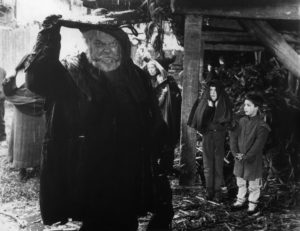A discussion came up on Reddit the other day about how Hamlet can be so concerned over the fate of Claudius’ soul (and whether he goes to heaven or hell), while being engaged in a revenge murder himself. Shouldn’t he worry about his own soul?
worry about his own soul?
But I took the question in a different direction. I’m wondering about Polonius. Hamlet has just gone to great lengths to explain to the audience why it’s not cool to kill a man when he’s praying:
Now might I do it pat, now he is praying;
And now I’ll do’t. And so he goes to heaven;
And so am I revenged. That would be scann’d:
A villain kills my father; and for that,
I, his sole son, do this same villain send
To heaven.
O, this is hire and salary, not revenge.
He took my father grossly, full of bread;
With all his crimes broad blown, as flush as May;
And how his audit stands who knows save heaven?
But in our circumstance and course of thought,
‘Tis heavy with him: and am I then revenged,
To take him in the purging of his soul,
When he is fit and season’d for his passage?
No!
Then what about poor Polonius? His sins are all still on his head. He’s basically an innocent man when Hamlet runs him through. True he didn’t kill anybody like Claudius did, he’s probably not got any mortal sins working against him. So where do we think he went – heaven, or hell? Or purgatory? Probably the third, he probably gets the same deal that Hamlet’s father got, ironically enough.
What I’m wondering, though, is what Hamlet thinks. He seems to be concerned only with himself:
I do repent: but heaven hath pleased it so,
To punish me with this and this with me,
That I must be their scourge and minister.
I will bestow him, and will answer well
The death I gave him.
It’s not all about you, Hamlet. He doesn’t seem to care about the fate of Polonius’ soul. Am I missing something? Hamlet’s distraught when his father’s ghost tells him about being doomed to walk the earth a certain time. It seems as if Polonius has just been sentenced to this same fate. So Hamlet’s got no sympathy for him at all?
Be sure to check out the new Shakespeare Geek Merchandise page, new for 2017 on Amazon! All new designs!

 A couple years ago the Oregon Shakespeare Festival made a bold move by commissioning 36 playwrights to translate the works of Shakespeare into modern English. I honestly can’t tell you how it went, as I didn’t follow the project. I’m not interested in your project if your premise is that Shakespeare has to be rewritten.
A couple years ago the Oregon Shakespeare Festival made a bold move by commissioning 36 playwrights to translate the works of Shakespeare into modern English. I honestly can’t tell you how it went, as I didn’t follow the project. I’m not interested in your project if your premise is that Shakespeare has to be rewritten.
 hat Falstaff (Henry IV) might have been at least partially based on Robert Greene, he whose wit is worth a groat.
hat Falstaff (Henry IV) might have been at least partially based on Robert Greene, he whose wit is worth a groat.